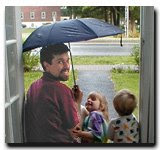To celebrate the first anniversary of our sustainable living tips column, I've collected them all -- from "Efficient Lighting" to "Shop Local" -- with links to the original articles.
A Year's Worth of Sustainable Living Tips
- January: When upgrading a friend's house or your own to energy-efficient compact fluorescent lighting (CFLs), put all of the old-fashioned energy-wasting incandescent bulbs in a box, label it, and store it in the basement, attic, or garage. It's better to replace as many bulbs as possible to start saving money (and the planet) as soon as you can. But don't throw away your old bulbs! Keep a stash of spare bulbs to use in a pinch. More »
- February: According to Efficiency Maine, 75% of electricity used for home electronics is consumed while the products are turned off. You can use a Kill-a-Watt meter to test which appliances are "vampires"--sucking electricity all night long. Stop them by unplugging them or putting them on a power strip with a switch. More »
- March: Earthworm castings are a gentle, slow-release, natural fertilizer that works especially well for seedlings. Mix 1 part castings to 3 parts potting soil to start seeds, or line the bottom and sides of seed furrows with 1"-2" of castings to give your little plants a healthy head start. More »
- April: The most sustainable source of fresh water falls from the sky. Try a rain barrel to collect and store rain water. More »
- May: Eating locally-grown food is a delicious way to help save the planet. If every Mainer spent just $10 per week on locally-grown food for six months, $100 million would circulate in Maine's economy. More »
- June: One rechargeable battery can replace up to 1,000 disposable batteries. More »
- July: Instead of gas, oil, pellets or wood, choose clean electricity for your household energy needs. We believe that in terms of sustainability, "green" electricity is the best option today and in the foreseeable future for all household energy needs. Efficient products are on the market now for space and water heating, refrigeration, lighting and all other household activities; it is relatively easy for consumers to go "all electric". Maine's electricity grid is already powered by clean energy sources such as rivers and wind, and through "green" electricity Mainers can choose to support these sources exclusively. More »
- August: Compost year round to ease the burden on your local landfill while building soil fertility in your own landscape. More »
- September: "Weatherizing" your home by sealing air leaks and adding insulation to ceilings, walls and floors is likely the most effective way you can protect both your personal climate and the global climate. More »
- October: As you tighten up your home for winter, it's all the more important to protect indoor air quality by choosing heaters, paints, finishes and cleaning products that don't emit noxious fumes. More »
- November: Save money while saving the planet. Personal thrift promotes planetary well being. But think carefully about every purchase. Don't save money at the expense of the planet--eating at a fast-food chain instead of an organic local restaurant, for example. Instead, find ways to balance your budget that bring global benefits. More »
- December: Shop locally to keep dollars circulating in your community. According to the Institute for Local Self-Reliance, every dollar spent at a locally-owned business creates more than three times as much local economic activity as a dollar spent at a national chain store. More »


No comments:
Post a Comment